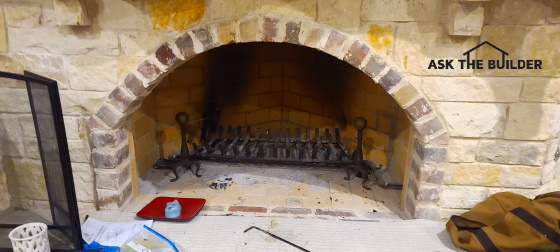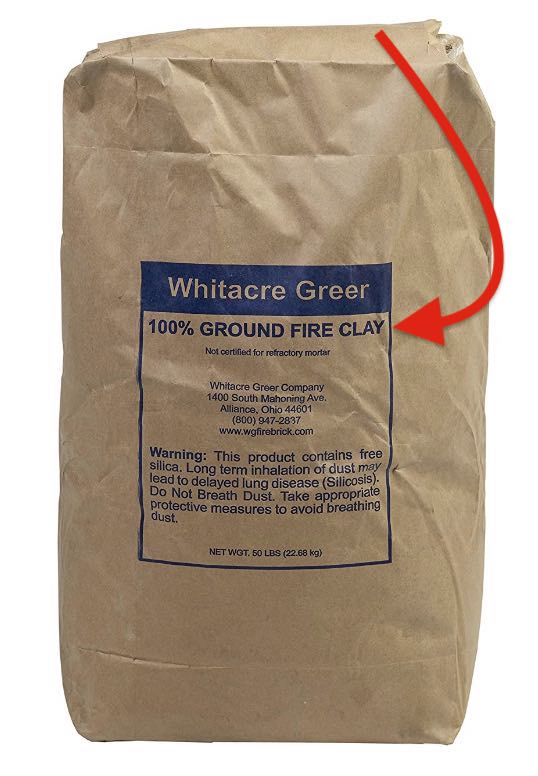Fix Smoking Fireplace – You May Have to Start Over

Fix Smoking Fireplace - This may look to you like a well-built fireplace. You’d be wrong. It was built by a buffoon. Copyright 2021 Tim Carter
Fix Smoking Fireplace - Bad News, Start Over
QUESTION: Tim I really need your help. I just moved into my new home and have a smoking full masonry fireplace. It’s 55 inches wide and has an arched opening that’s 33.5 inches at the peak of the arch.
It looks like regular brick mortar was used with the firebrick. For whatever reason, it has two flues and a damper on each one. It smokes like an old steam locomotive sending clouds of choking smoke into the house!
Cracking a window helps but doesn’t solve the problem. Should there only be one flue? Should I only open one damper? What’s wrong? Tim Y., Broken Arrow, OK
When I opened Tim’s email and saw his fireplace photo, I exhaled a heavy sigh. I was flooded with a range of emotions. Frustration, sorrow, mild anger, and sympathy were at the top of the list. It breaks my heart to get bad news like Tim’s knowing that it’s so easy to build things, even fireplaces, that work perfectly. The science of how fireplaces and chimneys work has been known for hundreds of years.
Read my Fireplace Design and Dimensions column to understand why Tim's fireplace is smoking.
CLICK or TAP HERE to get FREE BIDS from local fireplace experts to see if they MIGHT be able to fix your smoking fireplace.
Time to Bring Back Vocational Training?
I want to take this opportunity to once again plead the case for you to lobby your local school board to bring back vocational training in both grade and high school. In my opinion, it should be mandatory and all boys and girls should be exposed to the same learning material each year as they move through the 12 grades. We need to expose students about how houses work and the right way to do things because they're all going to need a roof over their heads as they grow older.
The vocational training not only will help give young people confidence about how to do minor repairs and talk intelligently with contractors, but it may also prove to be a springboard for those that might want to work with their hands in a rewarding life-long vocation. We must have new young people entering the trades each year. This is just common sense. Let’s expose the trades to children and allow them to see how rewarding it is to absorb this valuable knowledge.
Let’s roll up our sleeves and deal with what should have happened at Tim’s house as his fireplace was built. I’m sorry to say that Tim’s fireplace is the absolute worst job I’ve ever seen in my career. It was destined to fail from the get-go.
Who Has Clear Fireplace Building Tips?
The Brick Industry Association (BIA) has published clear and concise pamphlets for decades that show exactly how to build a residential wood-burning fireplace that will never smoke. Not only do these pamphlets cover the sizing requirements, but they also go into great detail how to properly size the flue and match it to the height of the chimney.
Are Fireplace Dimensions Critical?
It’s important to realize the size and shape of the firebox are directly related to the width and height of the opening to the fireplace. You can’t just guess as did Tim’s mason. As crazy as this sounds, Tim’s mason created a firebox that had two short stub walls that projected back into the firebox, then the two walls went off at 45-degree angles to meet at a hard 90-degree corner in the rear of the firebox. It’s no wonder smoke billowed into Tim’s house.
The shape and size of the firebox critical, but what you don’t see above the firebox is even more important. The shape and size of the throat of the fireplace as well as the design of the smoke shelf is of the utmost importance to ensure all the smoke and hot gases go up the chimney rather than roll into the room.
Can a Determined Non-Pro Build a Good Fireplace?
What’s sad about all this is that you with just moderate hand-eye skills can build a non-smoking fireplace using the easy-to-understand information available for free from the BIA. It’s maddening that anyone would have a smoking fireplace when you think about how the technical drawings, specs, etc. are all readily available.
Should I Use Brick Mortar in a Fireplace?
No. Regular brick mortar should never be used to install the special firebrick in fireplaces.
Let’s talk about the use of ordinary brick mortar inside fireplace fireboxes. It’s a mistake, plain and simple. The firebrick used in a firebox is special refractory brick meant for high temperatures. It’s quite possible the temperature in a roaring fire could exceed 1,000 degrees in certain situations. Normal brick mortar is not made to withstand this temperature swing from room temperature to 4-digit temperatures.
Is Fireclay the Best Fireplace Mortar?
Fireclay is the best thing to use to create thin joints between the firebrick. Fireclay is a special fine clay you mix with water to the consistency of a thick gravy. Skilled masons carefully dip the edge of a firebrick in this to apply the perfect amount of fireclay to each brick. The joint between the firebrick usually ends up no wider than 1/16th of an inch.

CLICK or TAP HERE to have this fantastic fireclay delivered to your home.
How Do you Use Fireclay?
With the wet fireclay on the edge of a firebrick, the mason then presses it against another one and the fireclay creates a fireproof bond. This fireclay is not much different than the clay my daughter uses to make pottery. she fires this clay in a kiln that reaches temperatures in excess of 2,100 F. It will easily withstand thousands of fires over decades of use without crumbling as ordinary brick mortar will.
I’ve created a special page on my AsktheBuilder website sharing all the BIA information with you. CLICK or TAP HERE so you can have a non-smoking fireplace:
Column 1395